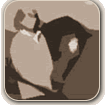 |
|||||||||
|
|||||||||||||||||||
|
|
Traditional
Breed Beef and Pork in Demand A Lake District farming and meat business is struggling to meet consumer demand in the north west for its traditional native breeds of beef and pork.
The business at Savin Hill Farm in the Lyth Valley near Kendal had small beginnings 12 years ago when Shaun Partington, made redundant from his job milking cows, bought three pedigree British White maiden heifers to run on his four acres. Shaun liked the breed because it was traditional and British and as the farm expanded – a further seven acres was bought seven years ago – Middle White pigs were added to the farm’s livestock. A further 50 rented acres now enables 55 head of cattle and 160 pigs to be run, supplying the quality meat business which sells direct to the public and the restaurant trade. Shaun was joined in the business be his sister Michelle two years ago. A teacher with a degree in furniture design, Michelle has played a big role in its continuing development and handles the marketing side. “Shaun bought the British White cattle because they were a traditional breed and he felt there would be a market for them. Also, at the time he was running the farm on his own and the cattle are naturally-polled and are easily handled. “At the time the breed was classified rare but now the Rare Breeds’ Survival Trust has them on the minority list with around 1,500 breeding females in the country. “The Middle White pigs are an endangered breed and the Saddlebacks which came last year are classified as at Risk by the Rare breeds Survival Trust.”
All Cattle born at Savin Hill are finished on the farm at between 24 to 30 months old and such has been the demand for the meat that the Partingtons have developed good relationships with other British White breeders around the country who now supply them with finished animals to the same standards as their own. “We were unable to cope with the demand for beef with our own cattle and by taking them off other breeders this has encouraged people either to expand their herds or to go into the breed. “Our over-riding philosophy with the business is about pure traditional native breeds and sustainably farming in this country which is something that a lot of people are struggling to do in the current climate of change. “By us creating a market for a quality product, consumers can support these breeds and hopefully encourage sufficient numbers of the animals and make it viable to farm them in this country.” With the cattle taking at least three years to produce (from conception to the final cuts of quality meat), the small acreage at Savin Hill has not been able to cope with the demand, but the faster turn-around time for the pigs has enabled them to develop this side of the meat business. “We have won several awards for our Middle White home-produced pork which is all born, bred and reared on our farm”. Pigs are eight to 10 months old at finishing with the Middle Whites weighing 65-80kg and the Saddlebacks will be 85kg-plus. Meat has always been sold direct to get the best price through farmers’ markets and fine food fairs in Lancashire and the Manchester area and now there is an increasing demand for wholesale meat direct to restaurants which Michelle plans to develop. On average, one head of Savin Hill's cattle is put through the system each month but this can rise to up to 10 during November and December when other breeders help meet the demand. A further six pigs on average are used each week. Michelle’s partner Paul Etherington, who has 20 years’ experience as a butcher, cuts the meat in the on-farm premises to include shin, skirt, loins, legs and belly. Quality ready-prepared meats are also sold such as loin of pork stuffed with basil and fresh sage, pork fillets wrapped in pancetta, stuffed belly pork with apricot and ginger. The Saddlebacks are used for bacon and their trim is used in the sausages which have around a 90 per cent meat content. They are made without preservatives or artificial flavourings and colourings. Meat from the Middle Whites, a traditional pork pig, will continue to be used for the fresh pork cuts and the trim will go into speciality pies including Pork and Lyth Valley Damson. “We all love to eat good food – it’s an important thing for us. My mum’s side of the family were in farming. Her grand-parents used to sell eggs and milk on Blackburn market. “We have been brought up to think that quality food is important. These days there are too many flavour enhancers, artificial preservatives and colourings being used in foods,” says Michelle, who enjoys being able to talk to her customers about what is in their products and how the meats are naturally-reared.
|
||||||||||||||||||

|
|
||||||||||||||||||
| home | agri-services | pedigree
pen | news | dairy | beef | machinery property | organisations | site map |
|||||||||||||||||||

Article by
Jennifer MacKenzie

